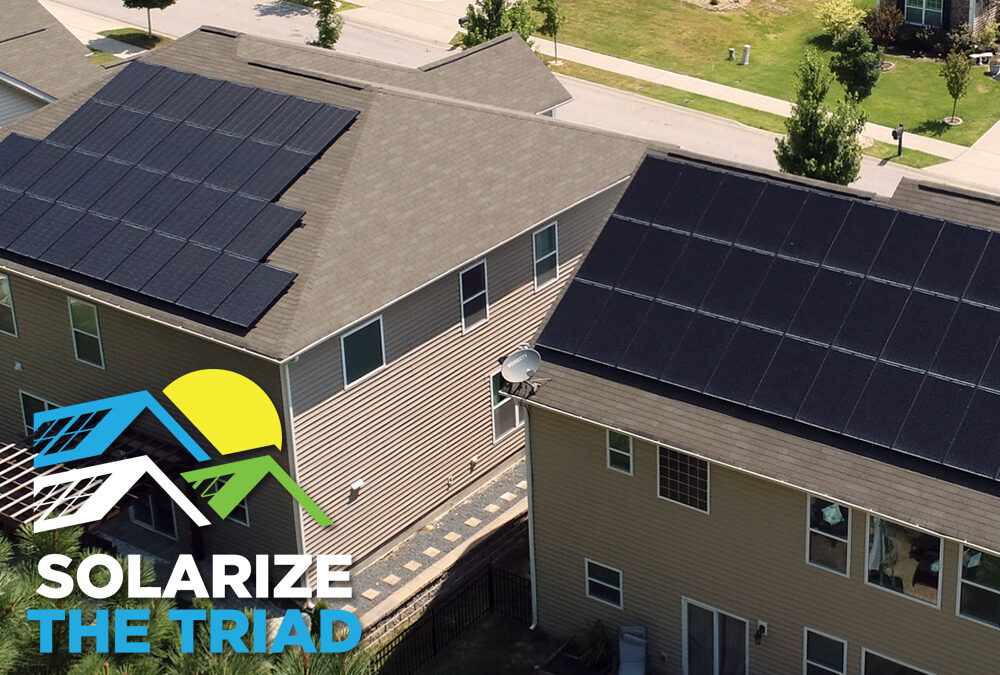
by Renu Energy | Mar 24, 2025 | Energy Storage, Residential
As we welcome March, we also embrace longer days with daylight saving time and the official start of Spring! More sunlight isn’t just great for outdoor activities—it’s also a major benefit for homeowners looking to maximize their energy savings with solar power.
Why More Sun Means More Savings
Did you know that homes with solar panels can generate up to 80% more energy in the summer compared to the winter months?* That’s because longer days and increased sunlight exposure allow solar panels to produce more electricity, reducing your reliance on the grid and lowering your utility bills.
By switching to solar now, your system could be fully operational by the time the most productive months of the year arrive, ensuring you get the maximum return on your investment.
Maximize Your Energy with Solar + Battery Storage
Solar energy isn’t just about producing power during the day—it’s also about storing energy for when you need it most. With a solar + battery backup solution, you can capture excess energy produced during peak daylight hours and use it later – whether at night, during peak-rate times, or in case of a power outage. This means:
- Less reliance on the grid
- Greater energy independence
- Peace of mind during unexpected outages
Why Spring is the Perfect Time to Make the Switch
Spring is a prime season for solar installations. By making the switch now, your system will be up and running just in time for summer—when solar production is at its highest. This allows you to start saving immediately while taking advantage of incentives and rebates that may be available in your area.
Take Control of Your Energy Future
Don’t wait until peak summer rates kick in—start saving now! Contact Renu Energy Solutions today for a free consultation and see how much you could be saving with solar.
*Source: Duracell Energy
by Renu Energy | Feb 4, 2025 | Residential
The Rising Cost of Power
In 2020, the average homeowner’s power bill was around $100 – but today, that cost has more than doubled with the average homeowner now paying over $200. Several factors contribute to this rise, including the increasing costs of maintaining the grid and the volatility of energy prices. Utility companies continue to pass these rising costs onto consumers, leaving homeowners with little control over their monthly bills. Without solar, you’re essentially renting your power from the grid, paying a monthly fee just to access electricity. However, when you choose solar, you take control of your energy. By generating your own power through solar panels, you can reduce or even eliminate your reliance on the utility company, protecting yourself from future rate hikes.
What’s even better? By adding a battery to your system, you can eliminate your dependence on the grid entirely. With solar + battery storage, you not only create your own energy but also store backup power for emergencies. This means that when the grid goes down due to storms, power outages, or unexpected failures, your home stays powered, keeping your lights on and your appliances running. Energy independence is more than just a convenience—it’s peace of mind, ensuring that you and your family have reliable electricity when you need it most.
The Financial Benefits of Switching to Solar
Switching to solar isn’t just about personal benefits—it’s also a smart financial decision. When you install solar, you gain access to a 30% federal tax credit, lowering your taxable income. Many states and utility companies also offer additional incentives, making solar even more affordable. Over time, your solar investment pays for itself through lower energy bills, increased home value, and long-term savings. Instead of throwing money away on ever-increasing electric bills, why not put that money toward something you own?
Solar Power and a Sustainable Future
Beyond financial savings, solar power contributes to a cleaner, more sustainable future. By reducing reliance on fossil fuels, you help lower carbon emissions and decrease the overall demand for energy produced by traditional power plants. Many homeowners who go solar are not just thinking about their own energy needs but are also helping to strengthen the grid and support a more resilient energy infrastructure. When more homes generate their own power, the strain on the grid decreases, benefiting the entire community.
So, why keep renting your power when you can generate, store and own your energy? Making the switch to solar is an investment in your home, your finances and a more sustainable future. Take control of your energy and start saving today!
by Renu Energy | Jan 17, 2025 | Energy Storage
Winter is here bringing colder temperatures and unpredictable weather. If you own a solar and backup battery system, now is the time to ensure everything is ready to keep your home powered through the season. Here are practical tips to help you maximize your system’s performance and maintain peace of mind during the winter months.
1. Prioritize Essential Loads
In the event of a grid outage, focus on powering only the most critical appliances and devices such as heating, refrigeration, and medical equipment. Limit the usage of things such as washers, dryers and dishwashers. Limiting non-essential energy use extends your backup battery’s life, ensuring power for what matters most.
2. Activate Your Feature In Your Manufacturer’s App
If your system has a storm watch feature, enable it. This setting allows your battery to anticipate incoming severe weather from the National Weather Service by optimizing energy storage in advance, giving you added confidence when storms are on the horizon.
3. Fully Charge Your Battery
Ahead of any expected power outages, make sure your battery is fully charged. A fully charged battery provides maximum backup power, helping you stay prepared for grid outages.
4. Adjust Your Backup Reserve Settings
Take advantage of your system’s customizable backup reserve settings. This feature lets you allocate a specific portion of your battery’s energy for outages, ensuring you’ll have power when it’s most critical. It is extremely important that you do not let your battery get below 0% charge.
6. Stay Updated with Your Battery Manufacturer
Check your battery manufacturer’s guidelines for updates and recommendations. Regular maintenance and software updates can improve system performance and ensure your battery operates efficiently during the winter months.
7. Understand Solar Production Limits
Solar panels rely on sunlight to generate energy. During a grid outage at night time, you will be completely reliant on the grid if you do not have a battery. If you do have a battery, be mindful and use the tips above to help you stay powered.
Why These Tips Matter
By following these simple steps, you’ll maximize the reliability and efficiency of your solar and backup battery system. These practices not only help you prepare for winter weather but also ensure your home stays powered, safe, and comfortable throughout the season.
At Renu Energy Solutions, we’re here to help you get the most out of your solar and battery setup. Whether you need expert advice or assistance with your system, we’re just a call away.
Stay warm, stay powered, and enjoy the season!

by Renu Energy | Jan 9, 2025 | Energy Storage
Severe winter weather, including ice storms and wintry mixes, is a common challenge in the Carolinas. Ice accumulation on power lines, freezing rain, and sleet can all lead to widespread power outages. Across the United States, winter storms are among the leading causes of disruptions to the electrical grid, leaving millions without power each year. In the Carolinas, where infrastructure is not always equipped for extreme cold, the risks are amplified during severe weather events.
How Winter Weather Impacts the Power Grid
The strain on the electrical grid during winter storms stems from both increased demand for heating and physical damage caused by freezing temperatures. Ice can weigh down power lines, leading to sagging or breakage. Freezing rain and sleet can accumulate on trees, causing branches to snap and fall onto power lines. Substations and transformers are also at risk of freezing, which can exacerbate outages.
Additionally, the widespread use of electric heat during cold weather puts significant stress on utilities or power companies. As temperatures drop, more households rely on electric heat, driving up power demand. This surge in usage can overwhelm the grid, making outages more likely and recovery times longer. These vulnerabilities highlight the importance of preparation for homes and businesses alike.
Solar Energy Systems: A Resilient Option
Homes equipped with solar energy systems and backup batteries are better prepared for power outages during severe winter weather. Solar panels, even in colder temperatures, can generate electricity as long as they receive sunlight. When paired with a backup battery system, solar energy can provide continuous power, even when the grid goes down.
Backup batteries store excess energy generated during the day, ensuring it’s available for use at night or during outages. This capability is invaluable during winter storms when grid reliability is uncertain. Batteries like the Tesla Powerwall 3, Enphase Battery 10c, or FranklinWH ap2 are designed to provide seamless power transitions, offering peace of mind during power loss events.
Homeowners with solar energy systems paired with battery backups have successfully weathered power outages caused by severe storms and grid failures. In real-world cases, residents with solar panel + battery systems have been able to use power for hours—or even days—during prolonged outages. During a severe winter storm, these systems allow households to keep the lights on, stay warm, and avoid the inconvenience and potential hazards of grid failures.
Tips for Preparing Your Backup Battery System
Enable Storm Readiness Features
Many modern battery systems include features designed for severe weather:
Charge Your Battery Fully Before a Storm
Ensure your battery is fully charged before severe weather hits. Cold temperatures can reduce battery efficiency, so starting with a full charge maximizes runtime during potential outages.
Inspect and Maintain Your System
- Make sure your solar panels are properly maintenance and
- Inspect batteries and connections for any signs of wear or damage.
- Set up system alerts in your app to stay informed about battery performance and weather conditions.
Best Practices During Power Outages
- Conserve Energy: Limit the use of high-power appliances like washers and dryers to extend battery life.
- Prioritize Essentials: Focus on powering heating, lighting, and refrigeration during an outage.
- Stay Informed: Use apps like Tesla, Enphase, or FranklinWH to monitor system performance and receive updates.
- Practice Safety: Avoid attempting repairs on equipment during a storm. Contact professionals for assistance if needed.
Why Consider a Battery Backup System?
If you already have solar, adding a backup battery to your solar system provides a reliable solution for managing power outages. Beyond storm readiness, batteries allow you to store excess energy for later use, reduce reliance on the grid, and maintain energy independence. Whether you choose Tesla Powerwall, Enphase Battery, or FranklinWH, these systems are designed to provide uninterrupted power during severe weather.

by Renu Energy | Nov 13, 2024 | Renu Solar News, Residential, Uncategorized
By Ken Haldin | November 13, 2024
WINSTON-SALEM, NC — Solarize the Triad continues to reach new lower price tiers as the community-led campaign offers several public opportunities this month to learn more about how to cost-effectively “go solar” through the campaign.
Already 43 Triad property owners have decided to purchase new renewable energy systems for their homes through this one-of-a-kind regionwide community-based group-buying program.
Several free community events are scheduled in the coming weeks for Triad homeowners to learn more about how to cost-effectively “go solar” through the campaign, which is led by a coalition of Triad community organizations.
A special Open House event featuring the campaign’s first buyer of a solar energy system and battery storage will enable Triad homeowners to take a close look at this system and get details about the volume-purchasing opportunity. The property, located in Northwest Winston in Old Town, will be accessible on Saturday, Nov. 16, from 10 a.m.-1 p.m.
Those who attend can meet the selected installer for the campaign as well as learn how a solar power installation on their property can lower their monthly utility spending through using a resilient and reliable form of renewable energy.
To attend this info session for free RSVP here for more event details. Anyone who brings their electricity bill information can get a preliminary evaluation immediately.
Solarize the Triad’s 7th tier of eight price tiers for residential purchasers offers a range between $2.20-$2.35/watt, depending on the equipment selected. Residential systems totaling 458kW have been contracted via the program.
These homes’ installations, once completed, will avoid 1,013,903 lbs. of CO2 in the Triad region. That’s the equivalent of more than 1 million miles driven by an average gasoline-powered passenger vehicle or over 100 gasoline-powered passenger vehicles driven for one year.
Triad property owners have just under one month remaining – until Nov. 30 – to sign up for free in order to become eligible for the campaign’s group-purchasing discounts before time elapses.
Other open-to-the-public events to familiarize the public with the Solarize opportunity are scheduled this month, including:
- Third Act NC Climate Cafe from 11 a.m.-12:30 p.m., Tuesday, Nov. 12 at 304 South Elm St. in Greensboro.
- Lot 63 Coffee and Taproom from 9-11 a.m., Wednesday, Nov. 13 at 614 Main St. in Winston-Salem
- Piedmont Environmental Alliance’s Annual Party from 5:30-7 p.m., Thursday, Nov. 14 at Second Harvest Food Bank of Northwest North Carolina. Second Harvest is located at 3330 Shorefair Dr. NW, Winston-Salem.
- Corner Farmers Market from 8 a.m.-12p.m. on Saturday, Nov. 16, where a Solarize the Triad table will be situated. The market takes place at 2105 W Market St., Greensboro.
Already more than 280 Triad property owners have signed up to receive a free proposal. Those who choose to buy through the Solarize the Triad campaign receive a rebate based on the lowest-price tier reached. Duke Energy Carolinas is also offering rebates for customers participating in its PowerPair program. In addition, a federal tax credit of 30 percent for newly installed solar energy systems and batteries is available to those who qualify.
Solarize the Triad is currently encouraging enrollment in the campaign since its official launch in July. Those interested may go to SolarizetheTriad.com to learn more about the program and sign up to receive a free evaluation without obligation.
The coalition of individuals and organizations in The Triad region fostering Solarize the Triad are dedicated to increasing awareness of local solar energy benefits; providing practical education, community outreach and support; reducing costs through group purchasing;; and creating a path toward greater and speedier local solar adoption. For assistance transforming your yard into a beneficial habitat for birds, pollinators, and wildlife through native plants, please visit forsythaudubon.org and ncwildflower.org.



